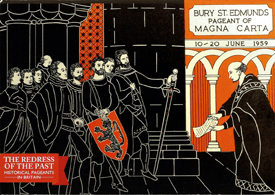- Home
- About Us
- The Great Charter
of Bury St Edmunds - The Magna Carta
- The Pageants
- Events
- Past Events
- Resources and Links
- Photo Gallery
- Rebecca’s Magna Carta Blog
Pageants Exhibition at Moyse’s Hall 4 May to 28 August 2015 FREE

Rebecca’s Magna Carta Blog
 |
“So why am I writing this blog in the first place..? I’ve written this blog to share my knowledge about Magna Carta, the Bury St Edmunds connection and the other events that lead up to and followed on from 1214/1215. |
I graduated from the University of East Anglia in 2011 with a History degree, but my love of history goes back as far as I can remember.
Bury St Edmunds’ link to Magna Carta caught my attention properly when I came home one summer, having just spent some time studying some sources about the Abbey. I decided I wanted to know more. So I did some research, and found I didn’t know as much about Magna Carta and the Abbey as I thought. This blog and my involvement in the 800th Anniversary celebrations of Magna Carta is the result of that research.”
Blog No.1: Why John?
The nobility of England had been rebelling against their kings for years before Magna Carta was created. So what was it about John’s reign that pushed them over the edge of rebellion and forced them to ‘get it on paper’? Perhaps it was the loss of English lands in France, or the disappearance of Prince Arthur, John’s nephew. It could also have had something to do with the fate of John’s one time ally William de Braose and his family.
It is worth noting that John was Henry II’s fourth son to survive infancy and was never expected to inherit. However, he is also often considered to have been Henry’s favourite son.
1177, aged 10, John was made Lord of Ireland and travelled there for the first time in 1185 to establish the English crown’s dominance of Ireland and create alliances. He insulted the local lords, wasted the money his father had sent with him and returned to England in disgrace.
1183, Henry II’s heir and John’s eldest brother, Henry the Younger died from dysentery. 1186, another of John’s brother’s, Geoffrey died in a tournament accident leaving his wife heavily pregnant with a boy who was named Arthur and a daughter, Eleanor. John was now significantly closer to the throne of England than anyone would have ever expected him to be.
In 1189 Henry II died and John’s brother Richard became Richard I. Two years previously Richard had declared his intentions to go on crusade and he saw his accession to the throne as an opportunity to raise the money and men to do this. In preparation for this he named his nephew Arthur as his heir. 1190, Richard left England for the Holy Land. It is during the years of his absence that the Robin Hood legends take place. John used the discontent with Richard’s regents to set himself up as a potential ruler with his own royal court.
1199, Richard died but John did not automatically inherit as Arthur had a better claim, his father Geoffrey had been John’s older brother. William Marshal and John’s mother Eleanor of Aquitaine secured the support of the English nobility and the throne for John.
In 1202, Arthur fought a campaign against John but was captured by John’s barons and was imprisoned in Chateau de Falaise in Normandy. In 1203 he was transferred to Rouen under the charge of William de Braose. Arthur vanished in April 1203, many at the time accused John of his murder either by own hand or on his orders.
In March 1204 Chateau Gaillard, Richard’s proud castle on the Normandy border with France, fell into French hands. In April, Eleanor of Aquitaine, John’s mother and a calming, constraining and dominating force at court, died. She had played a major role in securing the throne for John and in keeping the English baron’s support for her son. Her death also threatened to unravel the delicate alliances that her marriage to Henry II had created. By the August, John had lost all his lands in
France except for the Duchy of Aquitaine. He spent the next ten years of his reign raising money and armies to try to retake lands in France, and failing.
In 1210, William de Braose, once a royal favourite, fled to France after falling from favour, possibly because his wife openly accused John of Arthur’s murder, possibly because he knew exactly what had happened to Arthur. However, his wife Maud de Braose and his eldest son were captured and incarcerated. They were allegedly starved to death at John’s orders.
The manner of William’s fall from favour and the treatment of his wife and son discomforted the English nobility. Heap on top of this the loss of the lands in France, the failure to retake them and the amount of money wasted in the attempts as well as the problems he had with the church that will be talked about in another post and you have a country seething with discontent and ready to take on their king’s belief that he is above the law.